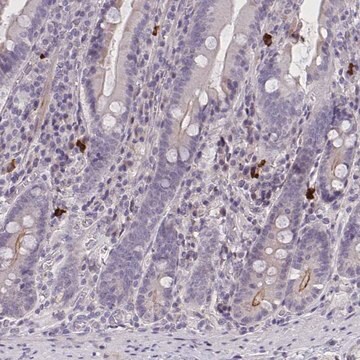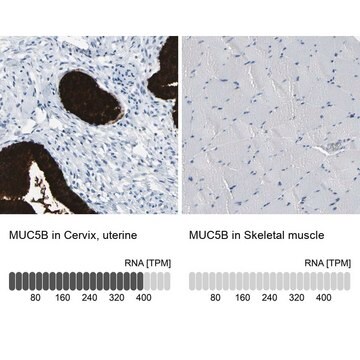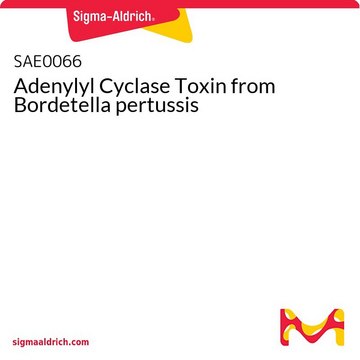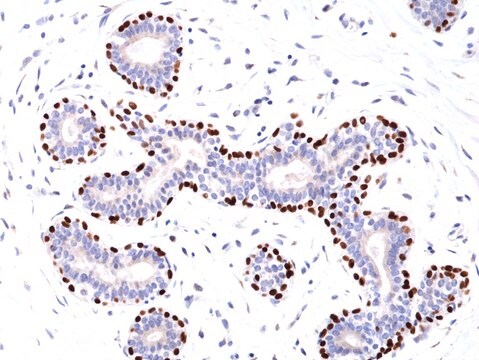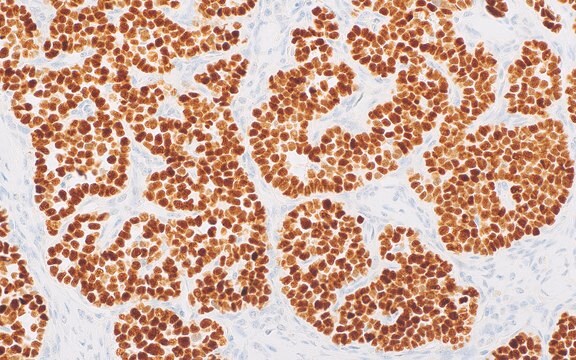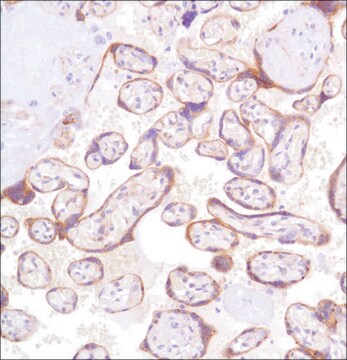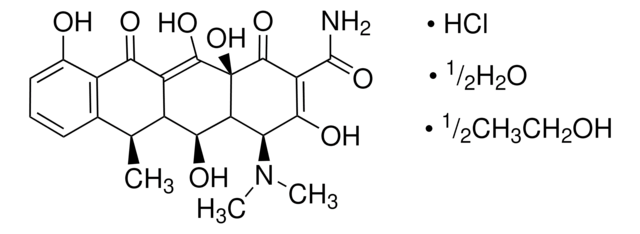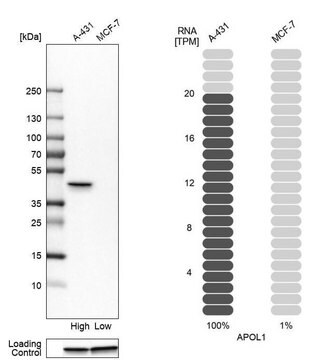추천 제품
생물학적 소스
rabbit
Quality Level
100
500
결합
unconjugated
항체 형태
culture supernatant
항체 생산 유형
primary antibodies
클론
EP1582Y, monoclonal
설명
For In Vitro Diagnostic Use in Select Regions (See Chart)
양식
buffered aqueous solution
종 반응성
human
포장
vial of 0.1 mL concentrate (257R-14)
vial of 0.5 mL concentrate (257R-15)
bottle of 1.0 mL predilute (257R-17)
vial of 1.0 mL concentrate (257R-16)
bottle of 7.0 mL predilute (257R-18)
제조업체/상표
Cell Marque®
기술
immunohistochemistry (formalin-fixed, paraffin-embedded sections): 1:100-1:500
동형
IgG
제어
breast, breast carcinoma
배송 상태
wet ice
저장 온도
2-8°C
시각화
cytoplasmic
유전자 정보
human ... PIP(5304)
일반 설명
Gross cystic disease fluid protein-15 (GCDFP-15) is one of four major component proteins found in the cystic fluid obtained from patients with fibrocystic changes of the breast. GCDFP-15 is a marker of apocrine glandular differentiation in both benign and malignant mammary epithelium. This protein has a widespread distribution in apocrine glands elsewhere in the axillary and perianal tissues, as well as in the sublingual and submaxillary salivary glands. The GCDFP-15 protein is a 15 kDa glycoprotein shown to be prolactin-inducible, and the GCDFP-15 gene has been cloned. Ultrastructurally, the GCDFP-15 protein has been localized in Golgi vesicle and cytoplasmic granules. The protein is released by exocytosis at the apices of the mammary epithelial cells. The primary application for this antibody product is the identification of breast carcinoma in the metastatic setting, or fluid analysis. In a study by Wick et al. on paraffin sections of 105 breast cancers and 585 non-mammary malignancies in order to assess its value in this context, anti-GCDFP-15 was compared with another putative mammary epithelial marker, alpha-lactalbumin (ALA), with respect to sensitivity and specificity for a diagnosis of breast carcinoma. Overall, the rates of specificity and sensitivity and positive predictive value for GCDFP-15 were 95%, 74%, and 74%, respectively. A consistent congruency between the reactivity patterns of primary and metastatic breast cancers was noted for GCDFP-15. Besides mammary carcinomas, the major tumor types that express GCDFP-15 were carcinomas of the salivary glands and sweat glands. Since the latter two types of lesions are unlikely to be diagnosed as metastatic breast cancer, statistical indices were recalculated after exclusion of these three tumor types. Following this exclusion, the adjusted rate of specificity of GCDFP-15 and positive predictive value for a diagnosis of metastatic carcinoma of the breast were each 99%. Another study by Bhargava et al. has shown GCDFP-15 staining of a higher percentage of cancer cells in lobular carcinoma as compared to ductal carcinoma of the breast.
결합
GCDFP-15 Positive Control Slides, Product No. 257S, are available for immunohistochemistry (formalin-fixed, paraffin-embedded sections).
물리적 형태
Solution in Tris Buffer, pH 7.3-7.7, with 1% BSA and <0.1% Sodium Azide
제조 메모
Download the IFU specific to your product lot and formatNote: This requires a keycode which can be found on your packaging or product label.
기타 정보
For Technical Service please contact: 800-665-7284 or email: service@cellmarque.com
법적 정보
Cell Marque is a registered trademark of Merck KGaA, Darmstadt, Germany
적합한 제품을 찾을 수 없으신가요?
당사의 제품 선택기 도구.을(를) 시도해 보세요.
Storage Class Code
12 - Non Combustible Liquids
WGK
WGK 2
Flash Point (°F)
Not applicable
Flash Point (°C)
Not applicable
가장 최신 버전 중 하나를 선택하세요:
시험 성적서(COA)
Lot/Batch Number
S Ansai et al.
The American Journal of dermatopathology, 17(3), 249-255 (1995-06-01)
We investigated immunohistochemically the localization of lysozyme and Leu M1 in normal skin, 76 cases of benign sweat gland tumors, 28 cases of malignant sweat gland tumors, 23 cases of extramammary Paget's disease, 7 cases of sebaceous carcinoma, 6 cases
G Mazoujian et al.
The American journal of pathology, 110(2), 105-112 (1983-02-01)
Gross cystic disease fluid is a pathologic secretion from breast composed of several glycoproteins, including a unique 15,000-dalton monomer protein, GCDFP-15. By the immunoperoxidase technique, GCDFP-15 was localized in the apocrine metaplastic epithelium lining breast cysts and in apocrine glands
U Raju et al.
Modern pathology : an official journal of the United States and Canadian Academy of Pathology, Inc, 6(5), 516-520 (1993-09-01)
Signet ring carcinoma of the breast often metastasizes to gastrointestinal tract and female genital tract. We report clinicopathologic features of 10 breast carcinomas with signet ring features, five of which had unusual metastatic patterns. The primary breast tumor in all
G Mazoujian et al.
The American Journal of dermatopathology, 10(1), 28-35 (1988-02-01)
Sixty-five cases of benign sweat gland tumors of the skin were studied for the expression and localization of gross cystic disease fluid protein-15 (GCDFP-15) by immunoperoxidase methods. There was positive staining of tumors of probable apocrine differentiation in 10 of
M R Wick et al.
Human pathology, 20(3), 281-287 (1989-03-01)
The identification of metastatic carcinoma of the breast may be difficult in the absence of a previous history of breast cancer. Various immunophenotypic markers have been introduced to aid in this process. A monoclonal antibody directed at a 15-kilodalton (kd)
자사의 과학자팀은 생명 과학, 재료 과학, 화학 합성, 크로마토그래피, 분석 및 기타 많은 영역을 포함한 모든 과학 분야에 경험이 있습니다..
고객지원팀으로 연락바랍니다.